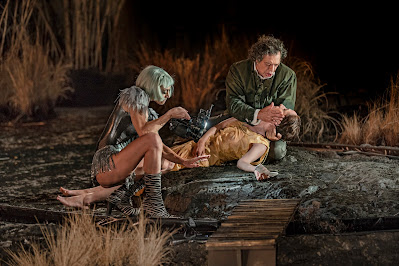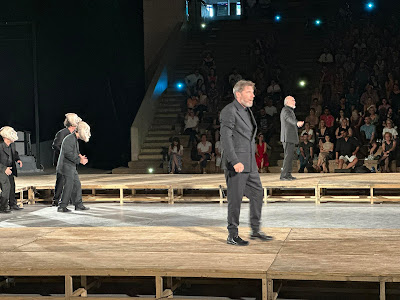Reviewed by James Karas
The National Theatre of Greece has staged an audacious production of Euripides’ Hippolytus at the Ancient Theatre of Epidaurus and subsequently took it on tour across Greece, I caught a performance at the Irene Papas Theatre in the School of the National Theatre, in Athens.
The production is directed by Katerina Evangelatos who also adapted and dramaturged the play. In other words, it represents forcefully her view of the play. The production presents Aphrodite, the goddess of sexuality and beauty, as a vengeful tart who is present on stage and on a video projection almost throughout the performance.
Artemis, the goddess of chastity and hunting, is worshipped by Hippolytus, the bastard son of Theseus and the queen of the Amazons. He considers her the best of the gods. Aphrodite thinks that Hippolytus considers her the worst of the gods and he shuns sex and marriage. She intends to punish him for his beliefs.
The method of punishment that she chooses is to have his stepmother
Phaedra become sexually infatuated with Hippolytus to the point that she will do
anything to have coitus with him. Phaedra is a decent woman and she resists the
temptation but she may be considered a tool of Aphrodite and attempts to seduce
Hippolytus. He rejects her and she commits suicide after leaving a letter for
her husband Theseus accusing Hippolytus of attempting to rape her. That’s the
story in a nutshell.

Aphrodite on the stage and her eyes on the video screen
Phaedra in the hands Kora Karvouni is a beautiful, decent woman who is overtaken by an uncontrollable sexual passion for her stepson. She discloses her passion to the Nurse (Maria Skoula), makes an attempt on Hippolytus and is too disgraced to continue living. Does she write a letter with lies to Theseus (he is away when all this is happening) on her own volition or under the influence of Aphrodite?

A distraught Theseus pulling his son out of the water
Artemis appears near the end of the play, a deus ex machina, played by the same actress and wearing the same costume as Aphrodite, except for a set of large stag horns on her head. She does not offer any help to the dying Hippolytus or to Theseus but does offer a cult in the name of Hippolytus. Euripides creates a huge dilemma about the conduct of the goddesses and the behaviour of the mortals and allows us to decide on who is right and who is wrong. Evangelatos seems to present a vengeful, evil and horrible Aphrodite but she does not leave Artemis in a much better position by explicitly having her played by the same actress, in the same costume.
Yiannis Tsortekis give a stellar performance as the authoritarian and misled Theseus who finally realizes the monstrous results of his conduct in cursing his son and then seeing his blood-soaked body at the point of death.
Maria Skoula does superb work as the Nurse and Dimitris Papanikolaou as the Messenger delivers the horrible news of Hippolytus’s fate.
The Chorus of Hippolytus is described as the women of Trozen (or Troezen, modern day Trizina), or the married women of Trozen. Evangelatos adds a Chorus of male hunters and one matter that has gained attention is the fact that they all appear naked near the end of the play. The National Theatre recommends this production for ages fifteen and over. Euripides’ odes are drastically cut but the performance of the Chorus is still effective.
The play was performed at the National Theatre of Greece School of Athens where the courtyard is called the Irene Papas Theatre. The outdoor theatre consists of scaffolding with seating for (my guess) no more than three hundred people. The set by Eva Manidaki has, as I mentioned, a large screen, bushes on the perimeter and a pond where we will see Phaedra’s very dramatic drowning and where Hippolytus’ bloodied body will be placed after he has been trampled by his horses. The costumes by Eva Goulakou are modern dress.
It is a well-acted and thought-out production that deserves the highest
praise.
______________________
Hippolytus by
Euripides, translated by Kostas Topouzis opened on July 7 at the Ancient
Theatre of Epidaurus and played at the School of Athens Irene Papas Theatre and
other venues. For more information:
https://www.n-t.gr/en/events/hippolytos/.
For photos and videos: https://www.n-t.gr/en/events/hippolytos#p1-40
James Karas is the Senior Editor - Culture of The Greek Press















